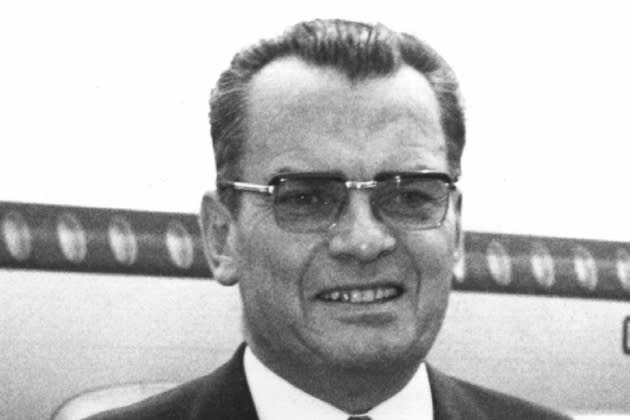Nazi Past Of Berlinale Founder Alfred Bauer Did Not Influence Festival Structure Under His Directorship, Concludes New Expanded Study

The Nazi past of the Berlinale’s founding director Alfred Bauer, which only publicly emerged in 2020, did not influence its structure and program under his directorship from 1951 to 1976, a new study by the festival has concluded.
The joint expanded report, carried out in partnership with the Leibniz Institute for Contemporary History (LfZ), follows a preliminary joint investigation, commissioned in response to revelations in the German newspaper Die Zeit in early 2020 that Bauer had played a significant role in the filmmaking apparatus of the Nazi regime.
More from Deadline
Berlinale Confirms In-Person Festival For 2023 & Introduces TV Series Award
Berlinale: 'Baqyt' and 'Aşk, Mark ve Ölüm' Win Panorama Audience Prizes
The new study was set in motion to ascertain whether Bauer’s previous Nazi sympathies had influenced the editions of the festival that he led. The Berlinale will hold a public panel on November 2 to discuss the findings of the report.
“We wish to thank the LfZ for the extensive, detailed research on Alfred Bauer. Since 2020, there has been the certainty that Bauer held a significant position in Nazi filmmaking and that he was able to continue his career in the cultural scene of the young Federal Republic through clever concealment,” said Berlinale co-heads Mariette Rissenbeek and Carlo Chatrian.
“The current study by the IfZ demonstrates this, but also comes to the conclusion that this did not lead to a Nazi ideological characterization of the festival programme. The view of the festival’s history has been sharpened, and this confirms once again how essential it is to keep critically reflecting on one’s own history”.
Entitled “Showcases in the Cold War. New research on the history of the Berlinale in the Alfred Bauer era (1951–1976)”, the new LfZ study noted that rumours regarding Bauer’s career under National Socialism were already circulating during the 1950s, but he had vehemently defended himself, dismissing them as “slander”.
The report noted that an investigation by Berlin Senate Administration in 1960 had apparently not collected enough evidence to build a case. It added, however, that documents related to the investigation have not survived in the archives.
Significantly, the report revealed that ahead of the first edition of the Berlinale in 1951, Bauer had wanted to show a film by Karl Ritter, one of the most prominent Nazi propaganda directors, while concealing the author, but was prevented from doing so by the Senate administration.
Beyond this incident, however, the LfZ said there were no further indications that Bauer’s choice of films for the Berlinale had been ideologically charged or that Nazi directors were deliberately included in the programme.
“Instead, Bauer emphasised his apolitical attitude towards the medium of film,” read the report. “Nonetheless, his work as festival director was not devoid of politics, but fit into the new system of the East-West conflict: Accordingly, the Berlinale was supposed to demonstrate the superiority of the Western system as a “Showcase of the Free World” with the assistance of the cultural asset of cinema,” read the report.
The study noted that in the early days of the Berlinale, Bauer was not the only person with viewed as having Nazi connections, but that the festival “was not shaped” by those figures.
“Ultimately, people who had been critical of the Nazi regime and, in some cases, had also been politically persecuted, also played an important role,” it said. “Former supporters and opponents of the Nazi regime met in the founding committee of the Berlinale, working under the observation of the British and American victorious powers in order to establish the Berlinale in the new front line of the Cold War,” said the report.
It added that while Bauer’s relationship with the Berlin Senate Administration had been fraught with conflict and constant disputes over areas of competence during his directorship, he made “a significant contribution to the success of the Berlinale by virtue of his organisational talent, his commitment to promoting high-quality films and his international networks.”
Best of Deadline
Sign up for Deadline's Newsletter. For the latest news, follow us on Facebook, Twitter, and Instagram.

